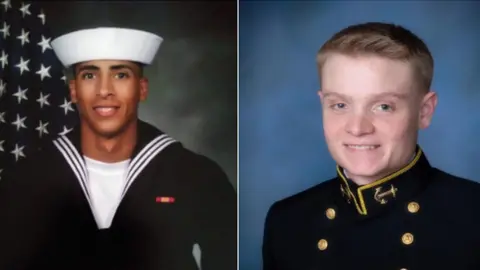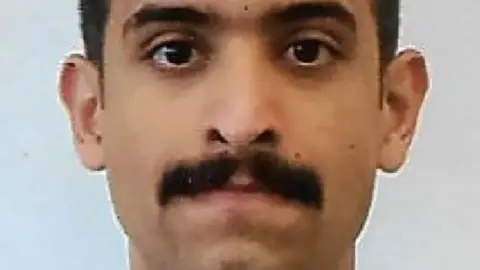Pensacola attack: Gunman 'played mass-shooting videos at dinner'
 US Navy
US Navy The Saudi gunman who attacked a Florida navy base on Friday played videos of mass shootings at a dinner beforehand, US media reports say.
Mohammed Alshamrani - who was training at the Pensacola base - killed three sailors before being shot dead.
The US Navy said the sailors "showed exceptional heroism and bravery in the face of evil".
They were named as Joshua Kaleb Watson, 23, Mohammed Sameh Haitham, 19, and Cameron Scott Walters, 21.
Several Saudi trainees have reportedly been held for questioning.
Authorities have not alleged that they were involved in the attack, which took place across two floors in a classroom on Friday morning.
The gunman played the mass-shooting videos to others at a dinner earlier in the week, several US media outlets report, quoting an anonymous official briefed on the investigation.
A Twitter user appearing to match Alshamrani's identity had also made a series of anti-US posts before the shooting, an online monitoring group says.
 Reuters
ReutersBut US Defence Secretary Mark Esper said on Saturday that he would not label the incident "terrorism" at this point.
Speaking at the Reagan National Defense Forum in California, he said investigators must be allowed to do their work.
President Donald Trump later pledged to review foreign military training programmes in the US. More than 850 Saudi nationals are reported to be in the country for such activities.
What happened on Friday?
Authorities were alerted to the shooting at the Pensacola base at 06:51 (12:51 GMT).
It took place across two floors of a classroom building and ended when a sheriff's deputy killed Alshamrani.
Eight people were also injured in the shooting, including two officers, who are expected to recover.

Family members of Joshua Kaleb Watson said he was shot several times but made it out of the building to alert first responders.
On Facebook, his brother Adam Watson wrote: "He died a hero and we are beyond proud but there is a hole in our hearts that can never be filled."
Capt Tim Kinsella, the base's commanding officer, said of the three sailors killed: "When confronted, they didn't run from danger; they ran towards it and saved lives."
Why were Saudis at the US base?
The Pensacola base has long offered aviation training to foreign military forces.
Saudi pilots started training there in 1995, alongside other personnel from Italy, Singapore and Germany.
Cpt Kinsella Jnr said that about 200 international students were enrolled in programmes there. According to its website, the base employs more than 16,000 military and 7,400 civilian personnel.
Alshamrani was a second lieutenant in the Saudi Air Force.
What has the reaction been?
Saudi Arabia is a key US ally in the Middle East and President Trump said the Saudi king called him after the attack to "express his sincere condolences and give his sympathies to the families and friends of the warriors who were killed".
Mr Trump said King Salman told him that "this person in no way shape or form represents the feelings of the Saudi people who love the American people".
The US president later said the Saudi leaders were "devastated" after the attack, adding: "I think they are going to help out the families very greatly."


Questions over the US-Saudi relationship
Just as he did in the wake of the murder of the dissident Saudi journalist Jamal Khashoggi in his country's consulate in Istanbul, President Trump is seeking to play down the significance of the Pensacola shooting.
For a president who largely sees foreign policy in transactional terms, Saudi Arabia is a great customer for the US. Billions of dollars in weapons sales translates into more than 5,500 temporary visas being issued to the Saudi military to come to the US. Saudi personnel make up about 16% of the foreign personnel being trained at US military schools and other facilities. The Pensacola shooting is already raising questions about the vetting of these individuals.
But more broadly it once again highlights the long-standing relationship between Washington and Riyadh - a relationship that many critics in Congress see as increasingly dubious in the wake of the Khashoggi murder and the Saudi military onslaught in Yemen.
